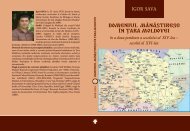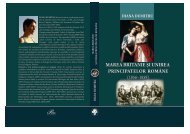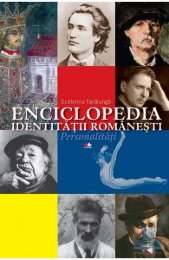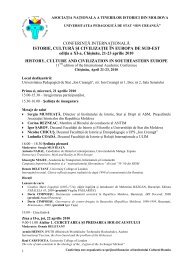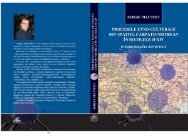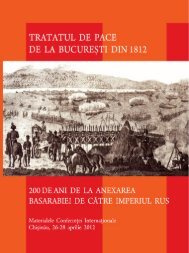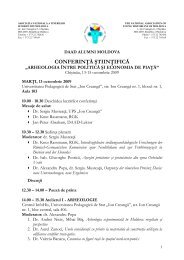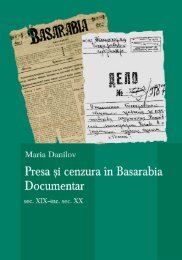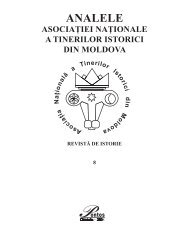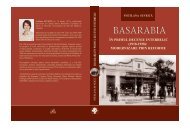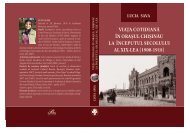Document PDF - Asociatia Tinerilor Istorici din Moldova
Document PDF - Asociatia Tinerilor Istorici din Moldova
Document PDF - Asociatia Tinerilor Istorici din Moldova
Erfolgreiche ePaper selbst erstellen
Machen Sie aus Ihren PDF Publikationen ein blätterbares Flipbook mit unserer einzigartigen Google optimierten e-Paper Software.
she, accor<strong>din</strong>g to the request of Your Excellency in your wiseness and because of the boy’s pious<br />
conduct would wish to offer him meals and to rent him a room. Since I also have my meals<br />
at her home I can then take better care of the boy so that he would not be forsaken here. Until<br />
now I have not noticed any kind of laziness or that he would want to go in other directions, and<br />
I hope that also for the rest of the time he would be able to progress for the well-being of the<br />
entire community. The teacher who gives him private tutoring hours is working assiduously<br />
with him and praises the boy that he is interested in all liberal arts. As far as my remuneration<br />
is concerned, it is 2 fl orins per year for every foreign boy, but I am much happier for this remuneration<br />
when I notice that the boys are making progress in learning.<br />
Students themselves took the initiative to search for other sources of fun<strong>din</strong>g. The most<br />
common sources of fi nancing university studies, namely help from rich relatives or acquaintances,<br />
borrowing money from friends, fellow students, etc., and taking a variety of jobs at the<br />
study place were not unknown paths taken by Košice students.<br />
After the town council and rich relatives, students would also try to borrow money from<br />
other acquaintances in Košice or elsewhere. Two letters preserved in the town archives in<br />
Košice illustrate a few situations of this type and provide additional interesting details concerning<br />
the fi nancial affairs of students. 62 The fi rst letter, dated November 4, 1570 is signed by<br />
Johannes Scholius, an employee at St. Elisabeth church in Wrocław, who complained to the<br />
town council about Johannes Stockelius, a student in Wittenberg, who had been in debt to him<br />
since 1563 and had never returned the money he owed. The story begins with the arrival of a<br />
messenger from Wittenberg who delivered a letter from Stockelius. In this letter, the student<br />
implored Scholius to lend him thirty-fi ve tallers and promised to return them during the same<br />
year, a promise he never kept. Even worse, in the subsequent year came another quest for<br />
money, this time for twenty-fi ve tallers: but at the named day, not only did he not return anything,<br />
but in the following year, on the twenty fi fth day of March, he came to me almost crying<br />
and imploring me to add to the previous thirty-fi ve talers now twenty-fi ve talers in loan, which<br />
he promissed to return with certainty, together with the previous thirty-fi ve talers, at the following<br />
market in Cracow in the same year. 63 This debt was not returned either - but at that market<br />
in Cracow not only did he not return to me a single penny, but he did not even write to me for<br />
several years 64 – and only at the insistence of Tomas Hilarius, pastor in Košice, did Scholius<br />
receive an insignifi cant part of his money: the previous year he did write to me, though not<br />
voluntarily but instigated by the venerable man Thomas Hilarius, pastor at your church. The<br />
latter sent me in the past summer, through Johannes Debretzinus, ten talers in the name of<br />
Johannes Stoeckelius, which were fi nally given to me this week, more precisely on the 29th of<br />
October. 65 Hilarius left his post in Košice without being able to bring this case to a happy end,<br />
therefore in 1570 Scholius saw no other solution except to address the town council: for which<br />
reasons, I come to you, wise and distinguished gentlemen, and ask you vehemently again<br />
and again, so that you consider and take a decision so that Johannes Stoeckelius returns to<br />
me, on the fi rst occasion, the remaining fi fty talers and that he would have them brought to<br />
62<br />
AMK H I, no. 3036/26 and no. 4226/100.<br />
63<br />
caeterum ad constitutum diem, non modo plane nihil reddidit, sed etiam sequenti anno, vigessimo quinto die<br />
martii, fere plorans ad me venit, orans, ut sibi ad priores triginta quinque taleros, adhuc viginti quinque taleros<br />
darem mutuos, quos mihi ad proxime sequentem mercatum Cracoviensem eiusdem anni, cum prioribus<br />
triginta quinque taleris certo remittere vellet.<br />
64<br />
caeterum ad mercatum illum Cracoviensem, non modo plane nullum nummum mihi remisit, verum etiam<br />
aliquot annos ne literam mihi scripsit.<br />
65<br />
superiore quidem anno ad me scripsit, verum non sua sponte, sed instigante eum reverendo viro domino<br />
Thoma Hilario, pastore ecclesiae vestrae. Hic per Johannem Debretzinum, decem taleros mihi nomine Johannis<br />
Stoeckelij, praeterita aestate misit, qui mihi demum hac septimana, nempe vigesimo nono Octobris sunt<br />
redditi.<br />
– 216 –



